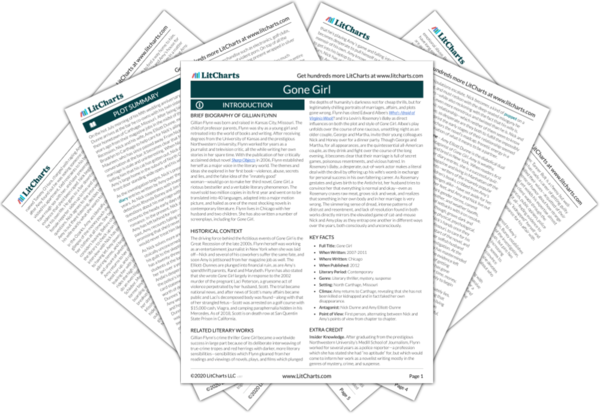Amy’s diary is the most potent symbol of Amy and Nick’s alternating attempts to control the narrative of their lives, their marriage, and indeed their entire selves. The structure of Gone Girl establishes itself early on as a kind of ballet between Nick and Amy’s points of views in the wake of Amy’s sudden and mysterious disappearance from their home in North Carthage, Missouri. Nick relays the events following Amy’s disappearance in real-time, while readers imbibe snippets of Amy’s diary, the entries stretching back several years and telling the story of their whirlwind romance, their difficult layoffs from magazine jobs in New York and their emotional move to Nick’s Missouri hometown, and at last their descent into a spiral of pain, cruelty, and violence.
At the midpoint of the novel, however, it becomes clear that Amy has orchestrated her own disappearance—and left behind a trove of incriminating clues in order to frame Nick for her murder—in order to get revenge against Nick after she finds out he’s having an affair with one of his students. Amy’s diary is revealed to be a construct—a piece of imaginative writing she expresses pride over having created. Most things contained within it are false, and Amy has constructed an entire persona for herself which readers of the novel have, in all likelihood, fallen for hook line and sinker. Thus, Amy’s diary comes to symbolize her desperate need to control the way other people see her, and to come off as unimpeachably perfect and “amazing” no matter the cost.
Amy’s Diary Quotes in Gone Girl
My parents have always worried that I’d take Amy too personally—they always tell me not to read too much into her. And yet I can’t fail to notice that whenever I screw something up, Amy does it right… […] This used to drive me mad… […] That my parents, two child psychologists, chose this particular public form of passive-aggressiveness toward their child was not just fucked up but also stupid and weird and kind of hilarious. So be it.
I am fat with love! Husky with ardor! Morbidly obese with devotion! A happy, busy bumblebee of marital enthusiasm. I positively hum around him, fussing and fixing. I have become a strange thing. I have become a wife. I find myself steering the ship of conversations—bulkily, unnaturally—just so I can say his name aloud. I have become a wife, I have become a bore, I have been asked to forfeit my Independent Young Feminist card. I don’t care. I balance his checkbook, I trim his hair.
[Nick] promised to take care of me, and yet I feel afraid. I feel like something is going wrong, very wrong, and that it will get even worse. I don’t feel like Nick’s wife. I don’t feel like a person at all: I am something to be loaded and unloaded, like a sofa or a cuckoo clock. I am something to be tossed into a junkyard, thrown into the river, if necessary. I don’t feel real anymore. I feel like I could disappear.












